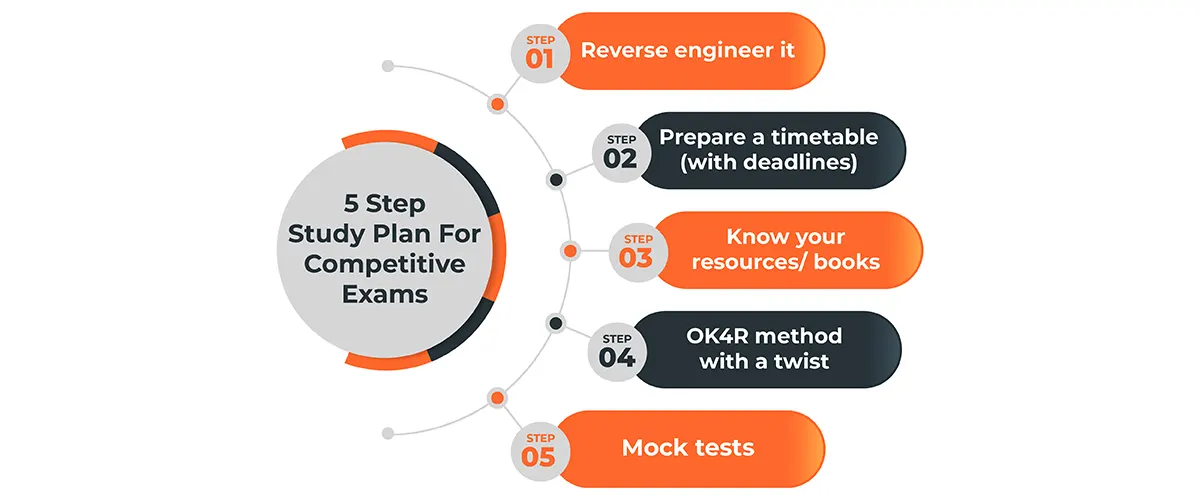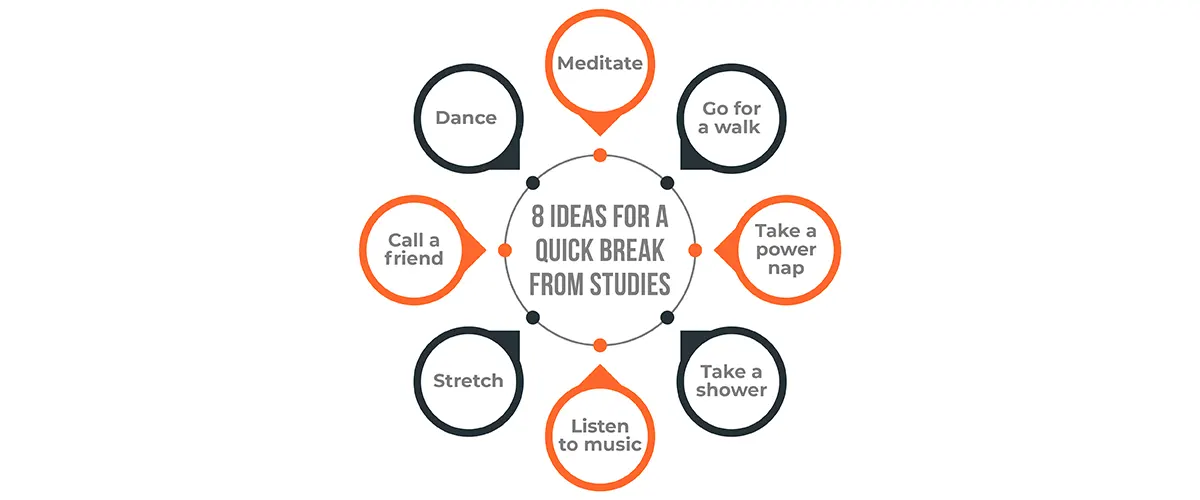Competitive exams are extremely challenging in India. 16.14 lakh students registered for NEET and 2.3 lakh for CAT in 2021. It will only be overwhelming if we count across all the exams. So, what will help you to stand out in so much crowd? A solid plan which tells you how to prepare for competitive exams.
Preparation Strategy for Competitive Exams

1. Reverse engineer it
What is the first mistake students make while preparing for exams? Stressing on completing the syllabus before knowing what the exam demands.
Your end goal is to clear the exam, so first, go through the last five years’ question papers. You have to check:
- Type of questions
- Which sections have more weightage
- Any repetitive topics
- Marking scheme
This reverse engineering will help you find what you need to study.
2. Prepare a timetable (with deadlines)
Once you know what topics you have to focus on, your next step is how to prepare time table for study. School, coaching and self-study, it’s undoubtedly tough to strike a balance. But if you can plan this well, you will already be in the top 10% to clear the exam.
5 Tips to prepare a timetable that would work:
1. Set the right goals
Set achievable goals split into daily, weekly and monthly targets. Schedule more time for the important topics from the reverse-engineered list. Keep time for lesser priority topics towards the end.
2. Do not copy someone else’s schedule
Prepare a schedule that suits you. Not because someone on social media said early morning or late night is the best time to study. Pick the time when you feel productive.
3. Consistency>Burnout
Reading 3 hours is much better than studying 12 hours a day for a week and finding it hard to maintain the rhythm.
4. Do not couple two tough subjects
Tying two tough subjects together will make it hard to focus. If at all you have to learn two subjects jointly. Pick an easy one to go alongside.
5. Breaks are not a waste of time
Research shows breaks increase your energy, productivity, and ability to focus. Yes, hustle culture is getting popular. It may sound cool to say: I study 13 hours a day. But how much of it was productive? Studying with full concentration for 5 hours is much better than learning with a tired mind for 13 hours. Schedule breaks to increase your productivity.

Pro tip: Scrolling through social media is not a break. A research published in the Journal of Behavioral Addictions shows participants who took a phone break mid-task
- Took 19% longer time to complete the assigned task
- Solved 22% fewer problems than other participants
3. Know your resources/ books
Another common mistake by students is learning from too many sources. It will only complicate the learning process. Choosing a reliable source will help you finish the topics on time.
Oswal Publishers has been a trusted book publisher for more than 35 years. We publish Oswal high score series to help students ace the toughest competitive exams with a high score(as the name suggests).
4. OK4R method with a twist
It’s time to start studying. But, what is the best way to study? Dr Walter Pauk devised a popular OK4R method where you study a topic in 6 stages:
1. Overview: You read headings, sub-headings, an introductory paragraph at first glance.
2. Key ideas: As a next step, you skim through the key ideas.
3. Reading: You fully read the topic.
4. Recall: After reading, you close the book and recall what you read.
5. Reflect: Rethink what you understood or learnt.
6. Revision: The last step is to schedule revision later. You come back to the topic and read again.
To make this study strategy more focused on competitive exams, we have customised it into eight stages(OK2RP2RP).
1. Overview: You go through headings, sub-headings, an introductory paragraph as usual. Also, check from your initial reverse engineering list if it’s an important topic.
2. Key ideas: You skim through the key ideas.
3. Reading: Fully read the topic and understand the concepts.
4. Recall: Recall the concept you just read.
5. Practice: This is crucial. Practice as much as questions on the topic.
6. Reflect: The next step is to rethink what you understood or learnt and find your mistakes.
7. Revision: After a few days, come back to the topic and read again.
8. Practice: Practice more questions to perfect your preparation on the topic. And you are ready to go.
5. Mock tests
If you collect a penny every time a topper said what helped them the most to prepare for the exam were mock tests, you will become a millionaire. OK2RP2RP method completes your both study and revision. Now, you are set to face the exam. But before meeting the real one, face a mock one to reduce the heat.
You will be able to
- Cut down the nervousness
- Find your weak spots
- Devise a time management strategy
- Know which topics to revise again
- Spot if you missed any topic
That’s a lot of benefits, making it non-negotiable to skip mock tests. So, join one to increase your scope to clear the exams.
There you go. You have a detailed strategy on how to prepare for competitive exams. As a bonus, you got a revision plan as well.
Time to start reverse engineering. All the best!
ALSO READ:


I couldn’t stop scrolling and reading, your content is truly one-of-a-kind. Thank you for all the time and effort you put into creating such amazing content.
Your posts are always so well-researched and informative I appreciate how thorough and detailed your content is